Text:
[A]I'm an example text [] But I want to be included [[]]
[A]I'm another text without a second part []
Regex:
\[A\][\s\S]*?(?:(?=\[\])|(?=\[\[\]\]))
Using the above regex, it's not possible to capture the second part of the first text.
Is there a way to tell the regex to be greedy on the 'or'-part? I want to capture the biggest group possible.
Edit 1:
Original Attempt:
Edit 2:
What I want to achive:
In our company, we're using a webservice to report our workingtime. I want to develop a desktop application to easily keep an eye on the worked time. I successfully downloaded the server's response (with all the data necessary) but unfortunately this date is in a quiet bad state to process it.
Therefor I need to split the whole page into different days. Unfortunately, a single day may have multiple time sets, e.g. 06:05 - 10:33; 10:55 - 13:13. The above posted regular expression splits the days dataset after the first time set (so after 10:33). Therefor I want the regex to handle the Or-part "greedy" (if expression 1 (the larger one) is true, skip the second expression. If expression 1 is false, use the second one).
